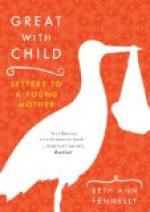This rule is the more important, because, if duly persevered in, it will generally prevent disease, and save the trouble and evil consequences of taking medicine at all. Meanwhile it will be advisable to call in a physician—not to give drugs, but to prevent the necessity of giving them. There is a foolish fear abroad that physicians, if called before a person is violently sick, will dose him with their drugs, as a matter of course, till they make him sick. But this, no judicious physician will ever do. It may have been done, though I believe it has been seldom. The more general course is to defer calling for medical advice, till it is too late to use preventive means; and medicine is then resorted to by the physician as a sort of necessary evil.
A judicious physician, seasonably called in, would in many instances save a severe fit of sickness, besides a great deal of expense, both of time and money.
But if the first symptoms of approaching disease are overlooked—if the child is fed, or rather crammed; with solid food as much as ever—and if no medical advice is sought, his sleep will soon become disturbed; he will be talking, starting, and tumbling about, and will have frightful dreams; or he will at other times be found smiling and laughing. To these, in the end, may be added, loss of appetite, paleness, emaciation, weakness, cough, and consumption; or colics, worms, and convulsions.
I do not undertake to say that the most judicious parental management, aided by the greatest medical skill, will always prevent disease; far from it. The child may and undoubtedly sometimes does inherit a tendency to a particular disease; or he may be made sick by error in regard to dress, exercise, &c. But so long as nine tenths of the disease and early mortality of the young might be prevented by due attention to all these means combined, so long will it be necessary to reiterate the sentiments of the present section.
CHAPTER X
EXERCISE.
SEC. 1. Objections to the use of cradles.—SEC. 2. Carrying in the arms—its uses and abuses.—SEC. 3. Creeping—why useful—to be encouraged.—SEC. 4. Walking—general directions about it.—SEC. 5. Riding abroad in carriages.—SEC. 6. Riding on horseback—objections. Riding schools.
This subject may be considered under the following heads: ROCKING IN THE CRADLE; CARRYING IN THE ARMS; CREEPING; WALKING; RIDING IN A CARRIAGE; AND RIDING ON HORSEBACK. These I shall consider in their order.
SEC. 1. Rocking in the Cradle.
There are two opinions in regard to the use of the cradle in the nursery. Some condemn it altogether; others think its occasional use highly proper. Those who condemn it, do it chiefly on the ground that it produces a whirling motion of the brain, which, while it inclines to giddiness and lulls to sleep, disturbs, in some degree, the process of digestion.




